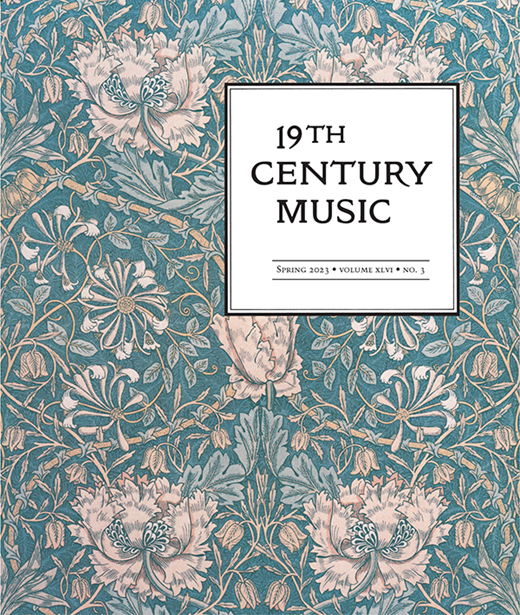"A Melody and Its Afterlives in Piano Music by the Schumanns and Brahms"
19th Century Music (Spring 2023)
19th Century Music (Spring 2023)
|
In the 1830s, Robert Schumann wrote Impromptus on a Romance by Clara Wieck (op. 5), a set of variations on the theme from Wieck’s Romance variée (op. 3). In the 1850s, Clara Schumann wrote variations (op. 20) on an “Albumblatt” from Robert Schumann’s Bunte Blätter (op. 99), which stimulated Brahms to write his own variations (op. 9) on the same theme. Clara and Brahms linked the two temporal nodes together by quoting the melody shared by Clara and Robert’s youthful ops. 3 and 5 in their later ops. 20 and 9.
These borrowings have stimulated interpretations that revolve around representations of people through such means as ciphers, quotations, allusions, and motives. Yet documentary and circumstantial evidence—diary entries and correspondence, private forms of music making (sight-reading and practicing in solo and chamber settings), material culture in the form of giving and receiving flowers, and a little-discussed yet remarkable piano arrangement of Robert’s Piano Quintet, op. 44, by Brahms—suggest that Brahms’s op. 9 quotation of the Schumanns’ melody was meant to recall a shared experience during a poignant moment in the year 1854. Not only to be read and recognized on paper, musical borrowings can gain expressive value as performative acts creating an open-ended field of meaning. |
Live performance of Brahms's Variations on a Theme by Robert Schumann, Op. 9
(Recording of Robert Schumann's Impromptus on a Romance by Clara Wieck, Op. 5, forthcoming)
(Recording of Robert Schumann's Impromptus on a Romance by Clara Wieck, Op. 5, forthcoming)
